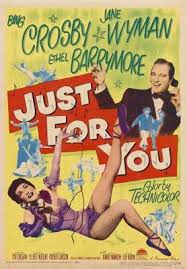
JUST FOR YOU
US, 1952, 104 minutes, Colour.
Bing Crosby, Jane Wyman, Ethel Barrymore, Robert Arthur, Natalie Wood.
Directed by Elliot Nugent.
Just For You is a comedy with the light touch. Bing Crosby plays a producer who is so busy that he hasn’t time to be with his children (interesting that Bing Crosby himself was accused of this in real life!). It is noted that Crosby’s wife, Dixie Lee, was dying during the production of this film and died just after its completion.
Bing Crosby always brings the light touch to his films and has charm with his singing. Jane Wyman, possibly better known for her more dramatic roles such as her Oscar-winning Johnny Belinda, also sang in a number of musicals at Warner Bros during the 1940s. Here she enjoys herself as the musical star who urges Bing to care for his children, going on a holiday with them. At this time Jane Wyman made a number of light films including Let’s Do It Again, with Ray Milland. Rounding out the cast are veteran actress Ethel Barrymore and the children played by Robert Arthur and a young Natalie Wood.
The film is based on a story by Stephen Vincent Benet who wrote classical stories that were made into films including The Devil and Daniel Webster and The Sobbin’ Women which became Seven Brides for Seven Brothers. The direction is by actor-director Elliot Nugent who made a number of agreeably light films, The Male Animal, The Cat and the Canary, Up in Arms and My Favourite Brunette. He also did a more serious film with The Great Gatsby in 1949.
1. The success of the film as light entertainment? Light entertainment of the early fifties, musical comedy, family film?
2. The film as a Bing Crosby vehicle? How successful in his personality, comedy style, music and singing? The use of colour, songs, the Broadway atmosphere, the Broadway numbers?
3. The film as a piece of Americana? Presenting traditional American values, criticism of them? The emphasis on careers, the fact that families can be neglected the way that children can grow up, school and the armed forces? A look at tradition and criticise of tradition? The final endorsement of inherited values?
4. Bing Crosby's style in the character of Gordon Blake? A music man, Broadway success, a widower? The particular characteristics of this personality? His relationship with son and daughter? Alienation? His love for Carolina? The choices that he made for his family? Trying to rectify his mistakes? His capacity for being misunderstood? His lack of timing and judgment, not understanding his children? Their harshness towards him?
5. The character of the son, as a neglected son, finding it difficult to see his father, trying to write songs, his love and hate for his father? The importance of his crush on Carolina and the misunderstandings? The resentments? His awareness of his foolishness, his running away to the Air Force? How convincing was his change, especially at the end?
6. The daughter and her relationship with her father? Her romantic attitudes? The governesses she had, her desire to be in a proper school? Her being humiliated by her father’s song, her final happiness?
7. How attractive was Carolina as a leading lady and heroine? Pleasant and nice, her love for Jordan, her willingness to help the children, the impact of the son’s misunderstanding, the happy ending?
8. The incidental portrayal of the school and the comment on exclusive schools? The character of the headmistress and her practicality? The contribution of Ethel Barrymore? Her afternoon tea and her trying to break down snobbery?
9. The portrayal of the Air Force and morale boosting by concerts etc?
10. How enjoyable is this kind of light film? A light examination of American values and way of life?
Its impact in the 50s? Now?